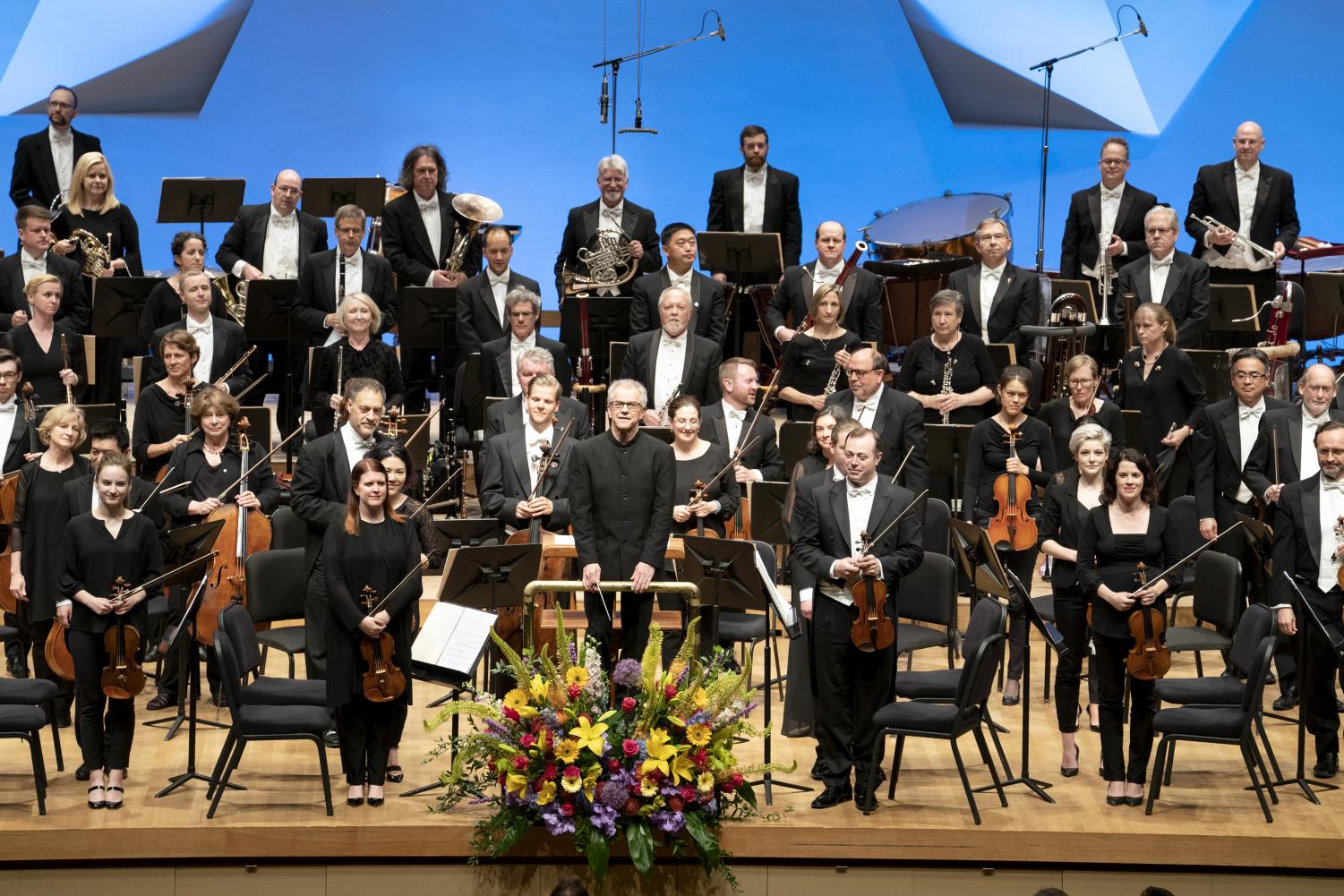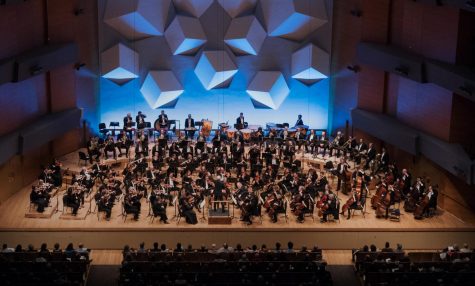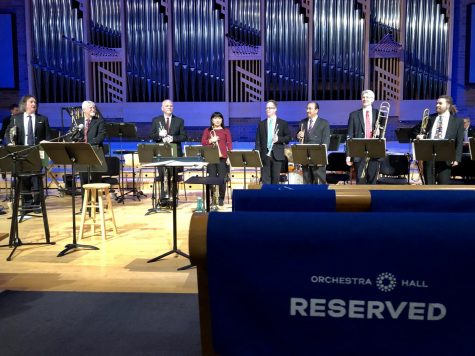Even though tough times are crushing performing arts, they still manage to spread good
May 12, 2020
No one had prepared for the COVID-19 pandemic, least of all performing arts venues. Because of social-distancing constraints, operatic and classical orchestras around the globe have stopped performances and ask for donations to help keep the music afloat. Even long-standing, world-class orchestras have asked for help. The New York Philharmonic, the oldest orchestra in the United States, has issued a striking plea on its website.
“Over 178 years the New York Philharmonic has weathered the U.S. Civil War and two World Wars. We survived the 1918 pandemic known as the Spanish flu. Still, the COVID-19 pandemic is the gravest crisis this Orchestra has ever faced, and the economic ramifications will be profound,” stated The New York Philharmonic’s website.
Of course, the impact of the COVID-19 goes beyond just an orchestra. The impact has hit every type of musician, from students up to the professional level.
Student Musicians
The Stillwater Concerto Concert, a staple for the Concert Orchestra, was slated to take place May 17. This year, now with the official cancellation of in-person school from Governor Tim Walz, the concert will not take place.
The reason this concert differs from the other concerts throughout the season is that four soloists are selected to play with the Concert Orchestra. This year’s seniors, bassist Josh Zimmer, violinist Sidney Foreman, saxophonist Peter Grace and clarinetist Sophie Browning would have had the opportunity to play their solos.
Some of the soloists, such as Zimmer, were “looking forward to getting a chance to play a solo with an orchestra for the first time.”
Other youth organizations, such as the Greater Twin Cities Youth Symphonies (GTYCS) and the Minnesota Youth Symphonies (MYS) have had different strategies to combat the pandemic.
MYS canceled the remainder of their season on March 18. This was meant to be the last concert for their co-artistic directors, Repertory conductor Claudette Laureano and Symphony conductor Manny Laureano, after 32 years of running the program.
GTYCS, on the other hand, as of the publication of this article, has only canceled events during April. They still intend to hold their annual Spring Festival Concerts, a slew of benefit concerts, and tour to southern Italy, a national especially impacted by COVID-19.
Our online rehearsals have consisted of our conductor sending out rhythm and pitch exercises and then we work through them as a group. It’s hard to do any actual preparation for pieces because we can’t play together at all.
— Josh Zimmer
GTYCS is preparing for all of these performances by convening online rehearsals, although they are not executed in their traditional sense.
“Our online rehearsals,” Zimmer, also a member of GTCYS, said, “have consisted of our conductor sending out rhythm and pitch exercises and then we work through them as a group. It’s hard to do any actual preparation for pieces because we can’t play together at all.”
Although all of Stillwater’s concerts have been canceled for the remainder of the year, orchestral music director Zach Sawyer is still managing to find ways to play together.
Every member of the orchestra submitted a video of their playing of Ralph Vaughan-Williams Five Variants of “Dives and Lazarus.” This will later be put through video editing software; the intended outcome will look something like Rotterdam Philharmonic Orchestra’s recording of Ludwig van Beethoven’s “Ode to Joy” chorus from his Symphony no. 9 or the Orchestra National de France’s recording of Maurice Ravel’s Bolero.
Sawyer is also hosting Friday Zoom sessions where students volunteer to play at a miniature recital. Members of the orchestra will also play together, with the aid of a recording, pieces they were going to prepare for their Concerto Concert. Thus far, they have played the final movement of Beethoven’s Symphony no. 5 and Antonín Dvořák‘s Slavonic Dance no. 7.
Professional Organizations
Professional ensembles, of course, face a more uncertain future. Local performing arts groups, such as the Minnesota Orchestra, the Minnesota Opera and the Saint Paul Chamber Orchestra have had to make never before seen changes to their season.
The Minnesota Opera and The Saint Paul Chamber Orchestra both canceled the remainder of their seasons. They both offered three options for concertgoers as far as tickets. One, their tickets could be a donation. Two, they could put their ticket value towards next season’s concerts. Finally, they offered a full refund for the tickets.
“In an effort to limit the spread of [COVID-19], the SPCO is cancelling all performances through the end of the 2019-2020 season,” said the Saint Paul Chamber Orchestra in an announcement to concertgoers. “This difficult decision has been made out of the deep care for our community [staff and audience].”
Although the Minnesota Orchestra offered the same three options as the two organizations above, they took a drastic step to ensure that current concertgoers would be able to attend their preferred concerts: they restructured the remainder of their season.
Four concerts from now until the season finale were moved to late Aug. and into early Sept. while the season finale, Osmo Vänskä conducting Gustav Mahler’s Symphony no. 9, was moved to next season.
The Beethoven Influence, a celebration by the orchestra of Beethoven’s 250th birthday, was slated to be performed this coming summer. It has now been moved to the summer of 2021.
“Designed to delay all concerts until August 2020, the revised concert calendar reschedules numerous performers and cancels all others through June 15, 2020,” the Orchestra’s website said in a statement.
To keep in touch with audiences, both the Minnesota Orchestra and the Minnesota Opera are providing “At Home” concerts with their musicians.
The Saint Paul Chamber Orchestra, along with the Berlin Philharmonic, is presenting free online concerts.
“Take a moment to feel the power of music,” the Minnesota Orchestra’s website reads.
Before things with the virus were piling on for musicians, the Minnesota Orchestra played, to an empty Orchestra Hall, Dmitri Shostakovich’s Symphony no. 7 – “Leningrad”, on Classical MPR. It is the only time the annual Friday broadcast in conjunction with the radio station has been played to an empty hall.
“We miss sharing live music with our audiences very much, and we have weighed many options around when the Orchestra can resume performances,” stated Music Director Osmo Vänskä in a statement.
The impact of the canceled concerts has not only impacted organizational revenue, but it also impacts personal careers. Bass-baritone and Resident Artist, Andrew Gilstrap of the Minnesota Opera and Des Moines Metro Opera, was set to play Masetto in Wolfgang Amadeus Mozart’s Don Giovanni.
“Then there was Don Giovanni as well,” Gilstrap said, “it was going to be a really great role for me to get off the ground because it’s something I could sing in any opera house in the world — today. It’s a role [that is] perfect for me at my age right now.”
To add to the pile of frustration and anxiety, Gilstrap said, “It’s hard not knowing where my next paycheck is coming from. Once the summer is over, I don’t have income.” He added, “Once I did process,” the shock of the performances being canceled Gilstrap said, “I just felt thankful that Minnesota Opera and Des Moines Metro Opera were fulfilling the contracts I had with them.”
Opera performers are in a different situation than are orchestral musicians. Whereas orchestral musicians are typically hired for life and protected by the American Federation of Musicians (AFM) labor union to keep their job, operatic performers are hired on a performance-by-performance basis and are protected by the American Guild of Musical Artists (AGMA) to ensure labor laws are met on stage.
The AFM has started an emergency financial assistance fund, a mortgage relief program, and a disability fund to workers affected by the virus. AGMA, on the other hand, has a much broader, more expansive donation pot that any union member can access.
The Minnesota Opera also has instructed their team of costume designers to start creating masks for the HealthPartners hospital system.
“We did start our entire production staff and costumes staff, they shifted over to making masks for health words and have a partnership through HealthPartners where we’re doing that for their hospital system in the area,” associate communications director Eric Broker said. “That’s been really important and a really nice thing because the Opera, we’ve been shifting and thinking more in the last several years about just responding and addressing community needs and using our skills and capabilities that we have as an opera company to do that. We’re great project managers. We have these people with expertise, professional expertise in making costumes, a really sensible and logical opportunity for us to help the country’s coronavirus display.”
Broker said that they make about 1,500 masks per week.
When asked about the importance of music in society, principal trumpet of the Minnesota Orchestra, Manny Laureano said, “’The study of music’ is a tree in which many branches ‘of one’s personality can develop. So the trunk, the biggest part of the tree is connected to the roots’ of a person’s personality. ‘The study of music and the ability to express oneself in a variety of ways will be dependent on the strength of the trunk you cultivate. Your branches, your variety of styles, will depend on the joint of the trunk to the start of the branch. So study music, stay stable and strong and you’ll never hesitate growing into the person you’ll become.’”



